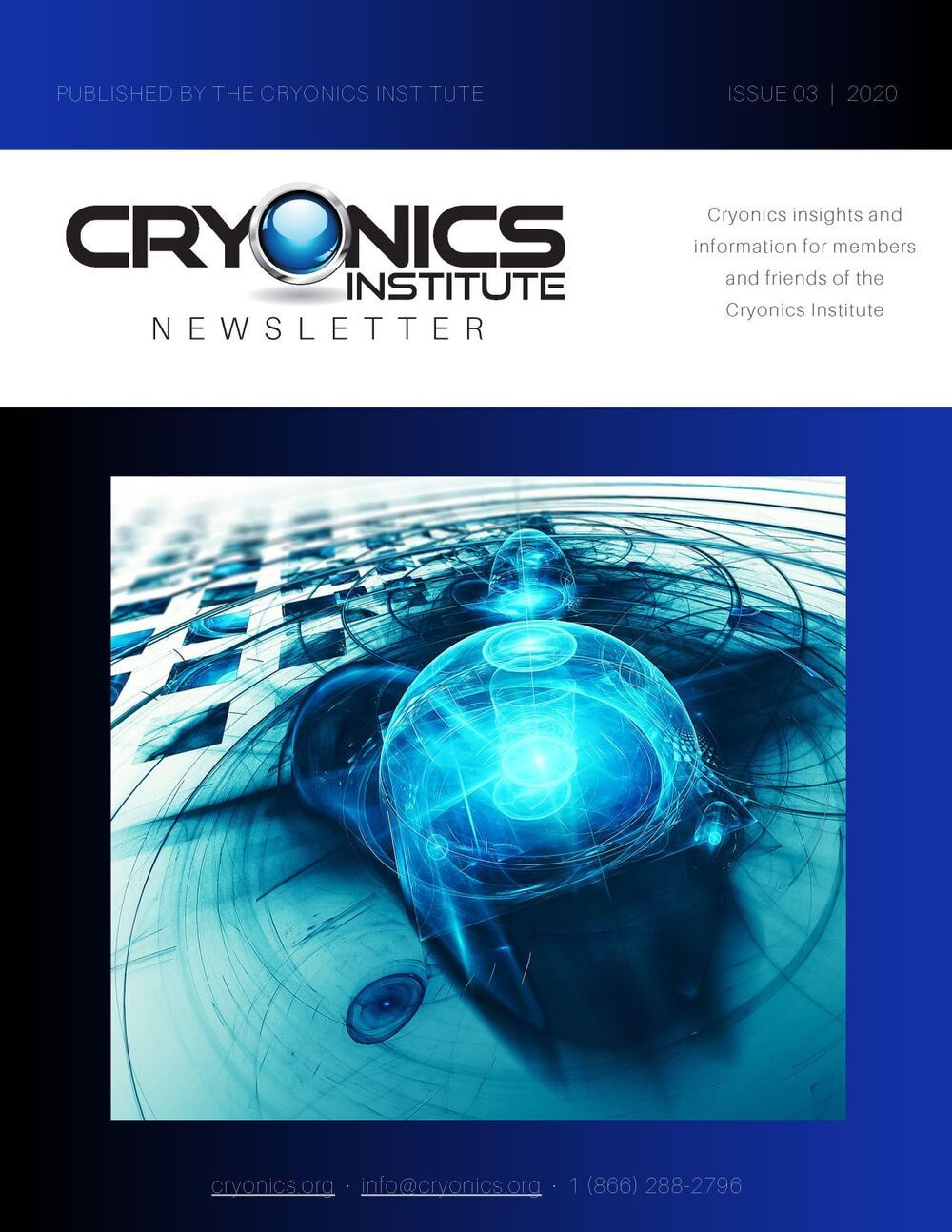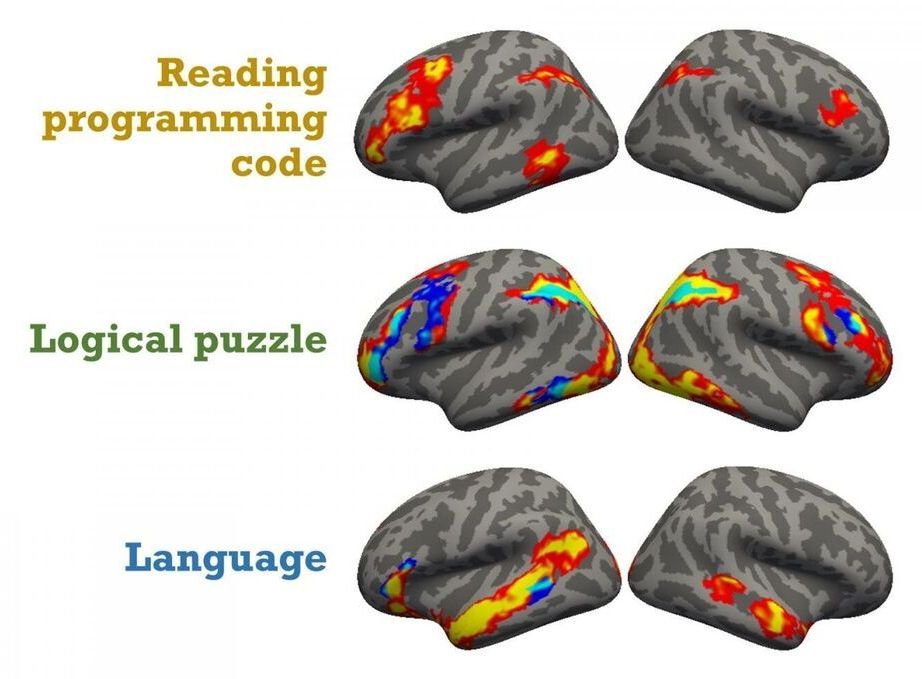THE CRYONICS INSTITUTE NEWSLETTER ISSUE 03, 2020 https://www.cryonics.org/images/uploads/magazines/CI_NEWS_2020-03.pdf


THE CRYONICS INSTITUTE NEWSLETTER ISSUE 03, 2020 https://www.cryonics.org/images/uploads/magazines/CI_NEWS_2020-03.pdf

A research group led by Prof. Chen Tao at the Ningbo Institute of Materials Technology and Engineering (NIMTE) of the Chinese Academy of Sciences (CAS), developed a novel soft self-healing and adhesive human-machine interactive touch pad based on transparent nanocomposite hydrogels, in cooperation with the researchers from the Beijing Institute of Nanoenergy and Nanosystems of CAS. The study was published in Advanced Materials.
With the rapid development of information technology and the Internet of things, flexible and wearable electronic devices have attracted increasing attention. A touch pad is a requisite input device for a mobile phone, smart appliance and point-of-information terminal. Indium tin oxide (ITO) has been used as the dominant transparent conductive film for manufacturing commercial touch pads, which inevitably have obvious shortcomings, like fragility.
To improve the stretchability and biocompatibility of touch pads to allow their interaction with humans, the researchers at NIMTE developed highly transparent and stretchable polyzwitterion-clay nanocomposite hydrogels with transmittance of 98.8% and fracture strain beyond 1500%.
ANYmal demonstrates how hybrid mobility can benefit quadrupedal robots.

The side effects are similar to that of the shingles vaccine. But studies show about 20 percent of the people who get the shingles vaccine skip the second dose.
Experts say if that happens with the COVID vaccines, there could be consequences.
The worst-case scenario is that skipping the second shot could allow the virus to spread and mutate, and potentially build resistance to the vaccines, according to Penn State University biologist David Kennedy.
Have you ever wondered why our bodies react as they do to stresses?
In this quick guide, I go right back to the primordial soup so to speak, and trace the factors that led to where we are today, and I finish off by looking at good and bad stresses so you can understand them, and use them to your advantage to stay fit and healthy, and even, maybe, to help you slow down aging…whilst we wait for the medical breakthroughs that will allow us to role back the years…
In Cellular Response To Stress — Using Stress To Your Advantage so you live healthier and longer.
We all want to live forever, well, I assume you do if you are following this channel anyway.
But how…
In How We Evolved With Stress — When Can Stress Be A Good Thing? I will look at how to live a healthier, happier and longer lifestyle to allow a healthier and happier life.

“People want to know what makes someone a good programmer,” Liu said. “If we know what kind of neuro mechanisms are activated when someone is programming, we might be able to find a better training program for programmers.” By mapping the brain activity of expert computer programmers while they puzzled over code, Johns Hopkins University scientists have found the neural mechanics behind this increasingly vital skill.
Though researchers have long suspected the brain mechanism for computer programming would be similar to that for math or even language, this study revealed that when seasoned coders work, most brain activity happens in the network responsible for logical reasoning, though in the left brain region, which is favored by language.
“Because there are so many ways people learn programming, everything from do-it-yourself tutorials to formal courses, it’s surprising that we find such a consistent brain activation pattern across people who code,” said lead author Yun-Fei Liu, a Ph.D. student in the university’s Neuroplasticity and Development Lab. “It’s especially surprising because we know there seems to be a crucial period that usually terminates in early adolescence for language acquisition, but many people learn to code as adults.”
There is no doubt that the future of transport is autonomous. Tesla is already rolling out a beta version of full self driving and that will be released fully in 2021, I am sure. From robotaxis to freight transport, our lives will get easier, cheaper and more convenient and for those with current mobility issues, the change will be even greater. Here I look at some of the ways that all our lives, the environment and the places we live will change…for the better. I cannot wait…can you?
In The Mind Blowing Future Of Transportation — How Self Driving Cars Will Change The World, I will look at the future of autonomous vehicles and how they will change our world…for the better.
Autonomous cars are the future, and whether it is geo-constrained services like Waymo or Tesla full self driving which could well be fully rolled out in 2021, self driving cars are the future of transportation, and many other vehicle sectors, such as long haul transportation.
They will make the roads safer and they will give us back massive amounts of previously wasted time, to do with as we desire.
Are you looking forward to our autonomous future?

Computer programming is a novel cognitive tool that has transformed modern society. What cognitive and neural mechanisms support this skill? Here, we used functional magnetic resonance imaging to investigate two candidate brain systems: the multiple demand (MD) system, typically recruited during math, logic, problem solving, and executive tasks, and the language system, typically recruited during linguistic processing. We examined MD and language system responses to code written in Python, a text-based programming language (Experiment 1) and in ScratchJr, a graphical programming language (Experiment 2); for both, we contrasted responses to code problems with responses to content-matched sentence problems. We found that the MD system exhibited strong bilateral responses to code in both experiments, whereas the language system responded strongly to sentence problems, but weakly or not at all to code problems. Thus, the MD system supports the use of novel cognitive tools even when the input is structurally similar to natural language.

The Sun exhibits a well-observed modulation in the number of spots on its disk over a period of about 11 years. From the dawn of modern observational astronomy, sunspots have presented a challenge to understanding—their quasi-periodic variation in number, first noted 175 years ago, has stimulated community-wide interest to this day. A large number of techniques are able to explain the temporal landmarks, (geometric) shape, and amplitude of sunspot “cycles,” however, forecasting these features accurately in advance remains elusive. Recent observationally-motivated studies have illustrated a relationship between the Sun’s 22-year (Hale) magnetic cycle and the production of the sunspot cycle landmarks and patterns, but not the amplitude of the sunspot cycle. Using (discrete) Hilbert transforms on more than 270 years of (monthly) sunspot numbers we robustly identify the so-called “termination” events that mark the end of the previous 11-yr sunspot cycle, the enhancement/acceleration of the present cycle, and the end of 22-yr magnetic activity cycles. Using these we extract a relationship between the temporal spacing of terminators and the magnitude of sunspot cycles. Given this relationship and our prediction of a terminator event in 2020, we deduce that sunspot Solar Cycle 25 could have a magnitude that rivals the top few since records began. This outcome would be in stark contrast to the community consensus estimate of sunspot Solar Cycle 25 magnitude.

Previous research has shown that eye contact, in human-human interaction, elicits increased affective and attention related psychophysiological responses. In the present study, we investigated whether eye contact with a humanoid robot would elicit these responses. Participants were facing a humanoid robot (NAO) or a human partner, both physically present and looking at or away from the participant. The results showed that both in human-robot and human-human condition, eye contact versus averted gaze elicited greater skin conductance responses indexing autonomic arousal, greater facial zygomatic muscle responses (and smaller corrugator responses) associated with positive affect, and greater heart deceleration responses indexing attention allocation. With regard to the skin conductance and zygomatic responses, the human model’s gaze direction had a greater effect on the responses as compared to the robot’s gaze direction. In conclusion, eye contact elicits automatic affective and attentional reactions both when shared with a humanoid robot and with another human.